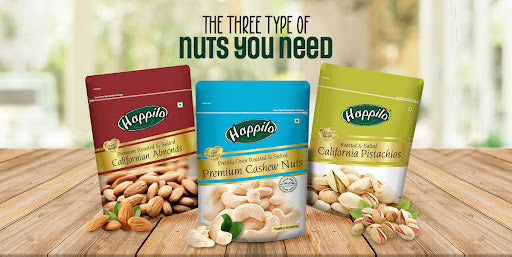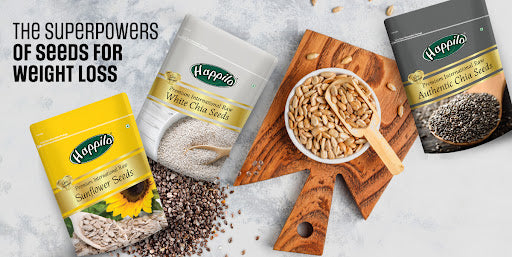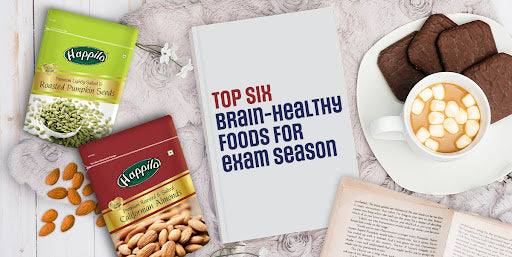What are the Benifits of Eating Nuts?
Nuts are a good source of nutrients and can have several health benefits when consumed as part of a balanced diet. Some of the benefits of eating different types of nuts include:
Heart health: Some types of nuts, such as almonds and walnuts, are high in monounsaturated fats and polyunsaturated fats, which are known to be heart-healthy. Studies have shown that consuming nuts can help lower cholesterol levels and reduce the risk of heart disease.
Weight management: Although nuts are high in calories, research has shown that people who regularly consume nuts are less likely to be overweight or obese. This may be due to the fact that nuts are high in fibre, which helps to keep you feeling full and satisfied.
Diabetes management: Some nuts, such as almonds and pistachios, are high in fibre and protein, which can help to regulate blood sugar levels. Studies have shown that consuming nuts may help to lower the risk of developing type 2 diabetes.
Brain health: Nuts are a good source of antioxidants and polyphenols, compounds that can help protect against oxidative stress and inflammation in the body. Some research has suggested that consuming nuts may have a protective effect on brain health and may even help to reduce the risk of developing Alzheimer's disease.
Cancer prevention: Some nuts, such as Brazil nuts and almonds, are high in selenium, a mineral that has been shown to have anti-cancer properties. Some studies have also suggested that consuming nuts may help to reduce the risk of certain types of cancer, including breast cancer.
Different Types of Healthy Nuts Available at Happilo
These different types of nuts are available in single packages as well as in combos.
Walnuts
Walnuts are a good source of omega-3 fatty acids essential for brain and heart health. They are also a good source of antioxidants and have been shown to help lower cholesterol levels and reduce the risk of heart disease.
 Almonds
Almonds
Almonds are high in monounsaturated fats, which are heart-healthy fats. They are also a good source of protein, fibre, and vitamin E, an antioxidant that can help protect against oxidative stress and inflammation.
Hazelnuts
Hazelnuts are a good source of monounsaturated fats and vitamin E. They are also high in manganese, which is needed for bone health and metabolism.
Cashews
Cashews are a good source of monounsaturated fats and vitamin E. They are also high in copper, an important mineral for producing collagen and iron absorption.
Pistachios
Pistachios are a good source of protein, fibre, and antioxidants. Ideal for gifting, they are also high in potassium, essential for maintaining normal blood pressure.
Brazil nuts
Brazil nuts are a good source of selenium, a mineral that has been shown to have anti-cancer properties. They are also high in magnesium, which is significant for bone health and muscle function.
Macadamia nuts
Macadamia nuts are high in monounsaturated fats and have been shown to help lower cholesterol levels. They are also a good source of thiamin, a B vitamin that is important for energy metabolism.
Pinenuts
Pinenuts are a good source of vitamin E and manganese. They are also high in monounsaturated fats and have been shown to help lower cholesterol levels.
Pecannuts
Pecannuts are a good source of antioxidants and have been shown to help lower cholesterol levels. They are also high in monounsaturated fats and have a high ratio of polyunsaturated to saturated fats, which is thought to be beneficial for heart health.
How to Add Nuts in Your Daily Diet?
There are many ways to add different types of nuts to your daily diet:
As a snack: Nuts make a convenient and satisfying snack on their own or in combination with other healthy foods like fruit or whole grain crackers.
As a topping: Sprinkle nuts over oatmeal, yogurt, or salads for a crunchy texture and added flavour.
In baking: Nuts can be used in various baked goods like bread, cookies, and muffins for added flavour and texture.
In savoury dishes: Nuts can be used to add crunch and flavour to savoury dishes like stir-fries, salads, and pasta dishes.
As a spread: Nut butter like peanut butter or almond butter can be used as a spread on toast, crackers, or fruit for a protein-packed snack.
It's important to remember that different types of nuts are high in calories, so it's important to be mindful of portion sizes. A serving of nuts is generally considered to be 1 ounce (28 grams), or about a handful. It's also a good idea to choose a variety of nuts to get the most health benefits of nuts.
What are Some Healthy Recipes Made From Nuts?
Who says Healthy can’t be homely or tasty? These have the following homely means with a healthy twist with different types of nuts!
- Almond Butter Chicken: In a blender, combine 1/2 cup almond butter, 1/4 cup coconut milk, 1 tablespoon tomato paste, 1 teaspoon garam masala, 1/2 teaspoon salt, and 1/4 teaspoon cayenne pepper. Pulse until smooth. Coat chicken breasts with the almond butter mixture and bake at 400 degrees F for 20-25 minutes or until cooked through.
- Cashew Curry: Heat 1 tablespoon olive oil in a large saucepan over medium heat. Add 1 diced onion and 1 diced bell pepper and cook until the vegetables are soft. Stir in 1 cup diced tomatoes, 1/2 cup water, 1/2 cup unsalted cashews, 1 tablespoon curry powder, and 1/2 teaspoon salt. As it starts to boil, reduce the flame to low, and let it cook for 10 minutes. Serve over rice or with naan bread.
- Chana Masala with Roasted Pistachios: Heat 1 tablespoon olive oil in a large saucepan over medium heat. Add 1 diced onion and 1 diced bell pepper and cook until the vegetables are soft. Stir in 1 cup cooked chickpeas, 1 cup diced tomatoes, 1 tablespoon garam masala, 1/2 teaspoon salt, and 1/4 teaspoon cayenne pepper. As it starts to boil, reduce the flame to low, and let it cook for 10 minutes. Serve over rice or with naan bread and top with roasted pistachios.
- Pine Nut Raita: In a blender, combine 1/2 cup plain Greek yogurt, 1/4 cup water, 1/4 cup pine nuts, 1 clove garlic, and 1/2 teaspoon salt. Pulse until smooth. Serve as a side dish with Indian-style dishes or as a sauce for grilled chicken or vegetables.
- Quinoa Salad with Cashews: Cook 1 cup of quinoa according to package instructions. In a mixing bowl, combine the quinoa with 1 cup diced vegetables (such as bell peppers, cucumbers, and tomatoes), 1/2 cup diced cooked chicken (optional), and 1/4 cup chopped cashews. Dress with a simple vinaigrette made with olive oil, lemon juice, and Dijon mustard.
- Walnut Pesto Pasta: In a food processor, combine 1/2 cup chopped walnuts, 1 cup packed fresh basil, 1/2 cup grated Parmesan cheese, 1/4 cup olive oil, and 1 clove garlic. Pulse until smooth paste forms. Toss the pesto with cooked pasta and serve.
Pre/Post workout meal recipes with Happilo’s Healthy Nuts recipes!
- No-Bake Peanut Butter Energy Bites: Combine 1 cup rolled oats, 1/2 cup peanut butter, 1/3 cup honey, and 1/2 cup chopped nuts (such as almonds or walnuts) in a mixing bowl. Roll the mixture into balls and refrigerate until firm.
- Almond Butter Banana Smoothie: Blend 1 banana, 1 cup unsweetened almond milk, 1 tablespoon almond butter, 1 scoop protein powder (optional), and a handful of ice in a blender until smooth.
The Ultimate Check List to Buy Nuts
Quality
Look for nuts that are fresh, not rancid or stale. They should be evenly colored and free from blemishes or discoloration.
Packaging
Choose nuts that are sold in airtight packaging or bulk bins. This will help to keep them fresher for longer. Avoid nuts that are sold in open bins or bags, as they may have been handled by multiple people and could be contaminated.
Variety
Choose a variety of nuts to get the most health benefits. Here are all types of nuts to consider include almonds, walnuts, hazelnuts, cashews, pistachios, Brazil nuts, macadamia nuts, pinenuts, and pecannuts.
Raw or roasted
Both raw and roasted nuts can be healthy, but it's important to consider the type of oil and seasoning used on roasted nuts. Choose nuts roasted in healthy oil, such as olive oil, and avoid those coated in sugar or other unhealthy additives.
Organic or conventional
Both organic and conventional nuts can be healthy, but organic nuts may be more environmentally friendly and may be grown without the use of synthetic pesticides.
Budget
Consider your budget when you buy nuts online. Nuts can be expensive, so comparing prices and choosing the most cost-effective option may be helpful.
Storage
Keep nuts in an airtight container in a cool, dry place to help extend their shelf life. They can also be stored in the refrigerator or freezer to help them stay fresh longer.
Conclusion
Nuts are a good source of nutrients and can have several health benefits when consumed as part of a balanced diet. As mentioned earlier, nuts are high in healthy fats, protein, and fiber, as well as a variety of vitamins and minerals. They are also low in cholesterol and sodium, and they contain antioxidants that can help protect against diseases such as heart disease and cancer. It is important to note that nuts are high in calories, so it is important to consume them in moderation as part of a balanced diet.
FAQ
What types of nuts are good for weight loss?
What is the shelf life of nuts?
For the best shelf life, store in an airtight container in a cool, dry place. They can also be stored in the refrigerator or freezer to help them stay fresher longer.
Here is a general guide to the shelf life of different types of nuts:
Raw nuts: Up to a year.
Roasted/Dried/Salted nuts: Up to six months.
Are nuts with shells better for you than buying nuts that are pre-shelled?
- Freshness: Nuts with shells may stay fresher longer than pre-shelled nuts because the shells protect the nut from light, air, and moisture. Pre-shelled nuts are more vulnerable to rancidity and may have a shorter shelf life.
- Convenience: Pre-shelled nuts are generally more convenient to eat than nuts with shells, especially if you are in a hurry or don't have a nutcracker. However, some people find the process of shelling nuts to be therapeutic and enjoyable.
- Cost: Pre-shelled nuts are generally more expensive than nuts with shells because they have been processed and are more convenient to eat. However, the difference in cost may be minimal, depending on the type of nut and where you buy it.
What are the types of mixed nuts?
- Classic mixed nuts: This type of mixed nuts typically includes peanuts, almonds, cashews, and pecans.
- Gourmet mixed nuts: This type of mixed nuts may include a wider variety of nuts, such as almonds, cashews, macadamia nuts, pecans, hazelnuts, and pistachios.
- Premium mixed nuts: This type of mixed nuts may include higher-quality or more exotic nuts, such as macadamia nuts, Brazil nuts, pine nuts, and pistachios.
- Savoury mixed nuts: This type of mixed nuts may be seasoned with herbs, spices, or other flavourings to add a savoury twist.
How many different types of edible nuts are there?
- Almonds
- Brazil nuts
- Cashews
- Chestnuts
- Filberts (hazelnuts)
- Macadamia nuts
- Pecans
- Pine nuts
- Pistachios
- Walnuts
- Peanuts (technically a legume, but often classified as a nut)
- Hazelnuts
- Acorns (edible when roasted and ground into flour)
- Beechnuts
- Coconuts (technically a drupe, but often classified as a nut)
- Ginkgo nuts
- Hickory nuts
- Pignoli (pine nuts)
- Sunflower seeds (technically a seed, but often classified as a nut)
- Nutmeg (the seed of an evergreen tree, but often classified as a nut)
Which is the most popular and healthy nuts?
- They are a rich source of various nutrients, including fibre, protein, healthy fats, vitamins, and minerals.
- Almonds are also considered heart-healthy, as they may help lower cholesterol levels and reduce the risk of heart disease.
- Almonds are versatile and can be easily incorporated into various recipes and meals.
Are soaked nuts better and more beneficial?
Soaking also helps activate certain enzymes that can improve the absorption of certain nutrients. Some research suggests that soaking nuts may also increase their levels of certain antioxidants, such as phenols and flavonoids.






Leave a comment
All comments are moderated before being published.
This site is protected by hCaptcha and the hCaptcha Privacy Policy and Terms of Service apply.